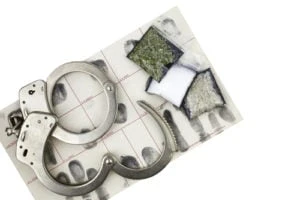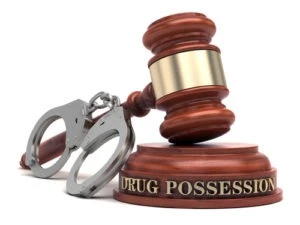
In Texas, possession of a controlled substance can be a felony charge in most situations and a misdemeanor in others. The punishment range for a possession charge is determined by the type and quantity of the drug the person possessed at the time. The greater the amount of the controlled substance and the more severe the penalty group, the higher the penalty for the drug charge.
Our Houston possession of a controlled substance lawyer will detail when a controlled substance is a felony or misdemeanor below.
What Is a Controlled Substance?
A controlled substance is an illicit drug or medication that is state or federally regulated. Under the federal Controlled Substances Act (CSA) and the Texas Controlled Substances Act (TCSA), it is illegal to possess, distribute, or manufacture controlled substances without a prescription from a doctor.
These substances are regulated because of their risk for abuse and addiction. The federal government, via the Drug Enforcement Agency (DEA), classifies drugs into five categories or schedules based on the level of abuse risk.
Texas also divides drugs into another set of categories called penalty groups. Controlled substances are divided into these groups based on how dangerous and addictive they are. The more severe drugs are placed in Penalty Group 1, and the least severe in Penalty Group 4.
Drug crimes are either a felony or a misdemeanor. Felonies, which range in degree, are significantly more serious crimes. For that reason, they carry harsher punishments under the law. Misdemeanors are lesser crimes, and therefore, receive less severe penalties.
Felony Charges in Texas for Drugs
Texas maintains four punishment ranges for felony drug charges:
- 1st-degree felony: 5 to 99 years in prison and a fine of up to $50,000
- Enhanced 1st-degree felony: 15 to 99 years in prison and a fine of up to $250,000
- 2nd-degree felony: 2 to 20 years in prison and a possible fine of up to $10,000
- 3rd-degree felony: 2 to 10 years in prison with a possible fine of up to $10,000
- State jail felony: 6 months to 2 years in a state jail and a possible fine of up to $10,000
Misdemeanor Charges in Texas
Misdemeanors in Texas fall into one of three categories:
- Class A: Up to 1 year in county jail and/or a fine of up to $4,000
- Class B: Up to 6 months in county jail and/or a fine of up to $2,000
- Class C: Up to a $500 fine and no jail time
For a legal consultation, call 713-225-1900
How to Tell if a Drug Possession Charge is a Felony or Misdemeanor Under Texas Law
Your penalty group determines your charge and penalties.
Each penalty group carries a range of penalties based on the weight of the drug discovered in a person’s possession. Whether a drug possession charge in Texas is a felony or a misdemeanor will depend on the penalty group and the weight that was found.
Penalty Group 1
The most dangerous and addictive group of drugs falls into the Penalty Group 1 category. For that reason, these drugs are also the most heavily regulated and come with the harshest punishments. Penalties for any amount of these controlled substances always begin with a felony charge.
Drugs in this group include:
- Opioids (which include painkillers like codeine, hydrocodone, and oxycodone)
- Methamphetamine (crystal meth)
- Cocaine
- Heroin
- Ketamine
- PCP
Penalty Groups 1-A and 1-B
Penalty Group 1-A includes LSD (lysergic acid diethylamide). Penalty Group 1-B includes fentanyl.
The degree of felony depends on the amount you are alleged to have in your possession. For example, let’s discuss possession of a drug in Penalty Groups 1 or 1-B:
- Possession of less than 1 gram is a state jail felony
- Possession of 1 gram or more, less than 4 grams is a third-degree felony
- 4 grams or more, less than 200 grams is a second-degree felony
- 200 grams or more, less than 400 grams is a first-degree felony
- 400 grams or more is a first-degree felony with at least 10 years in prison and a fine of up to $100,000
Penalty Group 2
Penalty Group 2 includes drugs that are considered to be slightly less dangerous than those in Penalty Group 1. Common hallucinogenic drugs are in this group, including:
- Ecstasy (MDMA)
- Psychedelic mushrooms
- Amphetamines (which includes Adderall)
Penalties for this group start at a state jail felony charge and extend up to 99 years in prison in addition to a fine of up to $50,000.
Penalty Group 2-A
Penalty Group 2-A includes synthetic cannabinoids. Possession of a drug in this group can be a misdemeanor or felony. Let’s explore weights to explain how:
- 2 ounces or less: a class B misdemeanor.
- More than 2 ounces, not more than 4 ounces: a class A misdemeanor.
- More than 4 ounces, not more than 5 pounds: a state jail felony
- More than 5 pounds, not more than 50 pounds: a third-degree felony
- More than 50 pounds, not more than 2,000 pounds: a second-degree felony
- More than 2,000 pounds: a first-degree felony with a fine of up to $50,000.
Penalty Group 3
Penalty Group 3 includes drugs that are stimulants or depressants. It also includes opiates and opioids, which are not in Group 1. Included among these substances are:
- Anabolic steroids
- Valium
- Methylphenidate (Ritalin)
You can be charged with a Class A misdemeanor for possessing a low amount of the drugs in this category with up to 1 year in jail and $4,000 in fines. For high amounts of the drugs in this group, a person convicted of possession may face 5 to 99 years in jail and a potential fine of up to $50,000.
Penalty Group 4
Penalty Group 4 classifies opioids and opiates not listed in other categories, as well as prescription drugs with potential for abuse. Penalties for this category at the low end are Class B misdemeanors punishable by up to 180 days in state jail and a fine up to $2,000. At the high end, you could be facing 5 to 99 years in prison and up to $50,000 in fines.
Marijuana
While marijuana is considered a controlled substance, it is not classified in any of the penalty groups. Instead, it has its own category. If you are caught with two ounces or less, you will be charged with a Class B misdemeanor.
If you are arrested with more than two ounces but not more than four ounces, the charge increases to a Class A misdemeanor. Anything more than four ounces is a felony charge in Texas.
Marijuana is not considered as dangerous as other illicit drugs in Texas. However, the state maintains harsh stances on it. Other states have either legalized or decriminalized the substance.
It remains illegal in Texas. A Houston drug possession lawyer can offer more information about when a charge is a misdemeanor or a felony in Texas.
Controlled Substances are Categorized by Addiction and Abuse Potential Under Federal Law
As stated above, federal law organizes controlled substances into five schedules or categories based on their potential for addiction and abuse.
Drugs that are a greater threat are classified in Schedule I while the least dangerous drugs are put into Schedule V. The categorization of controlled substances in these schedules formed the basis for the country’s war on drugs.
Schedule I Drugs
Controlled substances in Schedule I are the most dangerous and have the highest risk for abuse and addiction. There are no medical uses for them at the state or federal level. Heroin, marijuana, LSD, and ecstasy are among the drugs on this list.
Schedule II Drugs
Substances in this category are high for abuse or addiction risks but have accepted medical uses in particular cases. These substances can be obtained with a prescription; however, they typically create psychological or physical dependence.
Drugs in Schedule II include hydromorphone (Dilaudid), cocaine, oxycodone, methamphetamine, amphetamine (Adderall), hydrocodone (Vicodin), methylphenidate (Ritalin), and fentanyl.
Schedule III Drugs
Schedule III drugs have a low to moderate risk for physical or psychological dependence. If misused, however, they can be prone to addiction and abuse. They are considered less dangerous than the drugs in Schedules 1 and 2. Further, a doctor can prescribe them. Drugs like ketamine and anabolic steroids are on this list.
Schedule IV Drugs
Controlled substances in this Schedule have a clear medical use and low chances of resulting in abuse or dependence. Doctors prescribe them to patients who need them. They include Xanax, Valium, Ambien, Tramadol, Ativan, and other anxiety medications and muscle relaxers.
Schedule V Drugs
Schedule V represents the lowest risk and the least potential for addiction or dependence in users. Taken frequently or in larger quantities could lead to physical or psychological dependence. Robitussin AC and other cough syrups are on this Schedule. Nerve pain medications, such as Lyrica, also fall under Schedule V.
Click to contact our Houston lawyer today
Types of Illicit Drugs
There are four types of specific drug categories for illicit drugs:
- Narcotics
- Hallucinogens
- Stimulants
- Depressants
Narcotics
The term “narcotics” refers to specific drugs that are derived from the opium poppy plant. These drugs numb the senses and create a feeling of well-being. This is why they are used in pain relief medicine. Narcotics are called opiates, or, more modernly, referred to as “opioids.” Heroin, morphine, and hydrocodone are examples of narcotics.
Hallucinogens
Hallucinogenic drugs alter a person’s perception of reality and their mood. They affect the way a person sees and relates to time and space. Examples of these drugs include LSD (acid), PCP, mushrooms, and peyote.
Stimulants
Also called “uppers,” stimulants speed up the body’s processes by accelerating the central nervous system. Heart rate and blood pressure increase when using these drugs. Users tend to feel more alert, awake, and euphoric. Uppers include cocaine, crystal meth, Adderall, and Ritalin.
Depressants
Depressants are also called “downers.” They depress the nervous system, slowing down the body’s processes. Heart rate and blood pressure also decrease.
They can make the user feel drowsy, sleepy, or relaxed. Sedatives and tranquilizers are types of depressants. Commonly used depressants include Valium, Xanax, heroin, and Rohypnol (Roofies).
Complete a Case Evaluation form now
Potential Defenses to Drug Possession Charges in Texas
There are several potential defenses to possession of a controlled substance charges:
You didn’t Know You had the Drug in Your Possession
If we can argue that you did not know you had the drug on you or in your home or vehicle, we may be able to get the charges dismissed. This can be more straightforward to do if you have roommates or share a vehicle with someone else.
You have a Valid Prescription
If we can prove that you have a valid, current prescription for the substance found on your person, we can get the charges dismissed.
It was for Personal Use
If you have a large enough quantity of a substance, you may face possession with intent to distribute charges. We can argue that you intended to consume the substances yourself and not sell or distribute them in any way.
The Substance is not Illicit
We can argue that the substance in your possession is not what the cops think it is. If we can prove it, we can get your charges dismissed.
Fight Your Drug Charges with Blass Law
As the state continues to mount its war on drugs, possession of controlled substances is often a felony in Texas. In certain cases, drug possession could result in misdemeanor charges.
If you are facing drug possession charges or any other drug offense, call Blass Law. A Houston drug charges lawyer on our team will help you fight for your future.
Call or text 713-225-1900 or complete a Case Evaluation form




